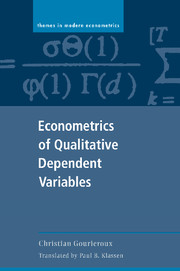Book contents
- Frontmatter
- Contents
- 1 Introduction
- 2 The Simple Dichotomy
- 3 Modelling
- 4 Estimation Methods and Tests
- 5 The Log-Linear Model and its Applications
- 6 Qualitative Panel Data
- 7 The Tobit Model
- 8 Models of Market Disequilibrium
- 9 Truncated Latent Variables Defined by a System of Simultaneous Equations
- 10 Simultaneous Equation Systems with Truncated Latent Variables
- 11 The Econometrics of Discrete Positive Variables: the Poisson Model
- 12 Duration Models
- Bibliography
- Index
11 - The Econometrics of Discrete Positive Variables: the Poisson Model
Published online by Cambridge University Press: 05 June 2012
- Frontmatter
- Contents
- 1 Introduction
- 2 The Simple Dichotomy
- 3 Modelling
- 4 Estimation Methods and Tests
- 5 The Log-Linear Model and its Applications
- 6 Qualitative Panel Data
- 7 The Tobit Model
- 8 Models of Market Disequilibrium
- 9 Truncated Latent Variables Defined by a System of Simultaneous Equations
- 10 Simultaneous Equation Systems with Truncated Latent Variables
- 11 The Econometrics of Discrete Positive Variables: the Poisson Model
- 12 Duration Models
- Bibliography
- Index
Summary
Introduction
Data describing economic behaviour often consist of variables assuming a small number of positive values. For reasons analogous to those given in the introduction to chapter 2, the classical linear model is inadequate for the study of how these variables depend on other quantitative or qualitative variables: the scatter of observations is ill suited to a linear fit; the assumption of normality appears unjustified as the variable takes a small number of values (and does so with strictly positive probabilities); the predictive equations may, in fact, yield values which the variables cannot assume, etc.
The formulations proposed in the literature (E1 Sayyad [Say73], Lancaster [Lan76], Gilbert [Gil79], and Hausman-Hall-Griliches [GHH84]) postulate that the discrete variable follows a Poisson distribution whose parameters are determined by the exogenous variables. This distribution is clearly justified when the variable in question describes the number of occurrences of an event during a given time span and, of course, when all the usual assumptions underlying a Poisson process hold. The model is useful, for example, to describe how many flights will arrive at an airport on a given day as a function of the date; how many work-related accidents will occur in a firm as a function of the characteristics of that firm; the number of bankruptcies in a given industry, how many patent applications will be submitted in a given year (Hausman-Hall-Griliches [GHH84]), etc.
- Type
- Chapter
- Information
- Econometrics of Qualitative Dependent Variables , pp. 270 - 283Publisher: Cambridge University PressPrint publication year: 2000
- 1
- Cited by

